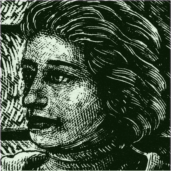It is certain that the fictional hero Lancelot existed--possibly in Wales--before the twelfth century when Chrétien de Troyes wrote The Knight of the Cart. In that French verse romance, Lancelot is already in love with Queen Guenevere, and is on his way to rescue her from the evil Méléagant. He has the characteristics which will distinguish him in the early thirteenth-century Prose Lancelot, notably absolute courage and skill in fighting, but the later work moderates the emotional excesses which make Lancelot almost a figure of fun in Chrétien's tale.
The unknown author of the Prose Lancelot amplifies Chrétien's statement that Lancelot had been adopted by a water fay, giving him a whole childhood in the realm of the Lady of the Lake. He is provided with companions and an appropriate education, including a lofty ideal of a knight's mission in life.
The Lady does not intend simply to add a fine knight to King Arthur's retinue. On the contrary, she makes certain that Lancelot remains her knight, knowing that he is destined to love the queen, and thereby ultimately destroy Arthur's kingdom. What distinguishes Lancelot from other warriors is magic. Already in Chrétien he is given a ring which enables him to tell the difference between magic and reality. In the Prose Lancelot and in the retelling that we have created, there are two kinds of magic: material, as seen notably in his strength-enhancing shields, and immaterial, as manifested in the essentially supernatural quality of Lancelot's fighting. These advantages, in addition to his unique physical beauty, inspire Arthur's powerful foe Galehaut to sacrifice his political ambition to his love for the young man.
Sensitivity, however, is not necessarily associated with being a great warrior—Galehaut is the significant exception that shapes our very retelling of the story—and Lancelot seems oblivious to the nature of his companion's feelings for him. It is interesting that in Marion Zimmer Bradley's novel The Mists of Avalon (1982) Lancelot is troubled by homosexual feelings of his own, and he is specifically attracted to Arthur. The fact that in the Prose Lancelot he has Galehaut buried in a tomb which will also be his own suggests, however, his own unconscious responsiveness to his companion.
Lancelot loves the queen for her beauty, and probably also for her glamour, but he certainly does not understand her. One of the most touching moments in medieval narrative occurs when he discovers that the phrase of farewell she spoke when he first set out for his knightly adventures, the phrase which was to inspire his unprecedented feats of prowess, was from her point of view a mere banality.



